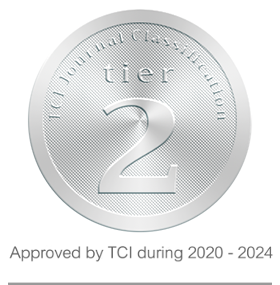COVID-19 Pandemic Effects on Sustainable Adaptations of Upstream Rubber Sector: A Case Study in Songkhla Province, Southern Thailand
Keywords:
COVID-19 effect on rubber, upstream rubber adaptations, rubber sustainability adaptationsAbstract
The objectives were to study the effects of COVID-19 on stakeholders in the upstream rubber sector, and their sustainable adaptations. Quantitative and qualitative research was conducted in Songkhla Province. Stratified sampling was used to select four groups of upstream stakeholders, comprising 280 rubber households, 13 rubber cooperatives, 11 fresh latex traders, 9 local middlemen and factories/exporters, and 16 RAOT officers which included 2 central rubber market officers. The research found the following to be the most substantial effects of COVID-19 on the society, the economy, and the production technology and environment of rubber households: less community interaction, worsened mental and physical health, lower incomes, more debts, and adjustments to their consumption and expenses. The study found that 77.7% of fresh latex traders were moderately affected despite the low amount of fresh latex and its low price. Rubber traders adapted by reducing expenses, reducing risks, and keeping financial liquidity by reducing the labor wage, changing selling locations, and increasing efficiency. All factories remained in operation though they experienced labor shortages and a low supply of fresh latex leading to an inability to meet demand for concentrated latex. The upstream rubber sector adapted by increasing production at concentrated latex factories, reducing costs in the process of production (especially by lowering the labor wage), and investing more in the rubber glove industry.
References
Charnvirakul, A. 2020. Notification of the Ministry of Public Health RE: Territories Outside the Kingdom of Thailand Defined as Disease Infected Zones of the Coronavirus Disease 2019 (COVID-19) Outbreak. Minister of Public Health, Bangkok, Thailand: 1 page.
Committee on Agriculture and Cooperatives. 2020. The Report of The impact of Coronavirus Disease (COVID-19) to Thailand Economy. The Secretariat of The Senate, Bangkok: 68 pages.
Department of Disease Control. (2020). Daily Report of Coronavirus Disease (COVID-19) In Thailand. Ministry of Public Health, Bangkok, Thailand.
Donghyun, P and Pilipinas, Q. 2020. COVID-19 and Physical Health. Asian Development Outlook 2020 Update: 4 pages.
Emergency Operation Center (EOC). 2020. WHO Report of The Situation of COVID-19 Pandemic in Thailand. Ministry of Public Health. Bangkok, Thailand: 3 pages.
FAO. 2020. Safeguarding input supply chains for small-scale agricultural producers in the context of COVID-19 in Africa. Food and Agriculture Organization of the United Nations (FAO).
OECD. 2020. COVID-19 and the food and agriculture sector: Issues and policy responses. https://www.oecd.org/coronavirus/policy-responses/covid-19-and-the-food-and-agriculture-sector-issues-and-policy-responses-a23f764b/ (Accessed on 10 October 2023).
Poovorawan, Y. 2021. The Impact of Coronavirus 2019 on Social Aspect. Kasetsart University, Bangkok, Thailand. Available online: https://learningCOVID.ku.ac.th/course (Accessed on 4 August 2021).
Public Relations Department. 2020. Statement of the Prime Minister’s Office on Emergency Situation. Available online: https://thailand.prd.go.th/sub_convert.php?nid=9200.
Rubber Authority of Thailand (RAOT). (2020). Annual Report of RAOT Operation. RAOT, Bangkok, Thailand: 70 pages.
Schmidhuber, J., Pound, J. and Qiao, B. 2020. COVID-19: Channels of transmission to food and agriculture. Food and Agriculture Organization of the United Nations (FAO).
Tranmer, M., Murphy, J., Elliot, M., and Pampaka, M. 2020. Multiple Linear Regression (2nd Edition); Cathie Marsh Institute Working Paper 2020-01. https://hummedia.manchester.ac.uk/institutes/cmist/archive-publications/working-papers/2020/2020-1- multiple-linear-regression.pdf
Tantrakarnapa, K. and Bhopdhornangkul, B. 2020. Challenging the spread of COVID-19 in Thailand. One Health. 11. 1-10. doi:10.1016/j.onehlt.2020.100173.
Thairath online. 2020. Covid-19 Crisis: growth opportunity of Thailand Agricultural Sector. Available online: https://www.thairath.co.th/news/business/1963665 (Accessed on 1 December 2020).
United Nations Thailand. 2020. Social Impact Assessment of COVID-19 in Thailand. Oxford Policy Management Limited, Oxford, OX1 Limited, Oxford, OX1 3HJ, United Kingdom: 176 pages. .
WHO. 2020. Coronavirus Disease (COVID-19) Pandemic. Available online: https://www.who.int/emergencies/diseases/novel-coronavirus-2019.
Wongwassana, S. 2021. Negative Influential Factors from COVID-19 Pandemic on Passenger Service’s Happiness in Work: A Case study of Bangkok Flight Services (BFS). Rajapark Journal 15 (39): 15-30.
Worldometer. 2020. COVID-19 Coronavirus Pandemic. Available online: http://www.worldometers. info/coronavirus/ (Accessed on 31 May 2020).
Downloads
Published
How to Cite
Issue
Section
License
Copyright (c) 2023 Songklanakarin Journal of Plant Science

This work is licensed under a Creative Commons Attribution-NonCommercial-NoDerivatives 4.0 International License.



